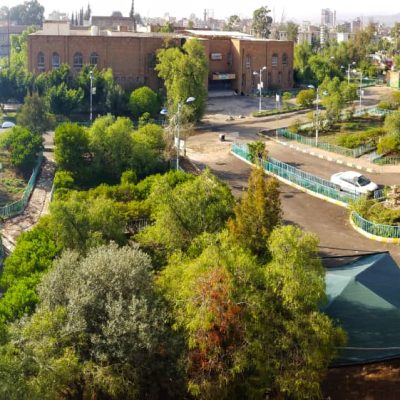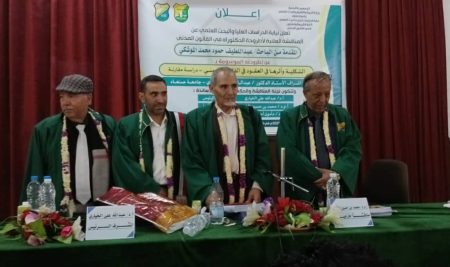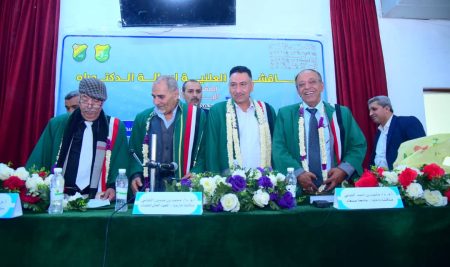
الريادة في العلوم الشرعية والقانونية

بناء القدرات وتقديم تعليم يربط بين الجانب النظري والتطبيقي البحثي في المجال الشرعي والقانوني ، وفق استراتيجيات وتقنيات تعلم حديثة بما يسهم في خدمة المجتمع وزيادة وعيه بحقوقه وواجباته الدينية والدنيوية .
About Collage
Faculty of Sharia and Law

Faculty of Sharia and Law
Established in 1970, the Faculty of Sharia and Law was among the first faculties established at Sana’a University. Dedicated to the study of Islamic law and legal sciences, the faculty has undergone several academic systems since its inception, reflecting the evolving academic landscape. Initially, the faculty adopted a five-year system of study modeled after Al-Azhar University’s Faculty of Sharia and Law. However, practical implementation revealed a low intake of students, necessitating the university to reassess the aforementioned study system and reduce the duration to four years. This revised study system was implemented starting in the 1972–1973 academic year. Both systems ran concurrently until the graduation of the last batch admitted under the original five-year study system in the 1976–1977 academic year.
In 1975, the university decided to divide the study into a two-track specialization system within the Faculty of Sharia and Law: one for Islamic Sharia and the other for law. Upon reaching the third level of study, students were required to choose one of these specialization tracks. However, the implementation of this system revealed a significant drawback: the enrollment of only a single student in the Islamic Sharia specialization. This enrollment disparity necessitated the abandonment of the two-track system and a return to a general specialization approach, without any distinction between Islamic Sharia and law. This unified system remains in effect today, as it is considered the most suitable for fostering a strong connection between Islamic Sharia and law in Yemen, where the legal system derives its constitutional provisions from the principles of Islamic Sharia.
In 1982, the university adopted the credit hour system, which was implemented in the Faculty of Sharia and Law alongside the semester system. However, this system proved to be incompatible with the nature of the faculty’s academic courses, as they were not conducive to segmentation but instead highly integrated. Consequently, the Faculty of Sharia and Law reverted to the full academic year system, which is an exception to the semester system that remains in place for the university’s other faculties. This full-year academic system is still in place today.
Recognizing the profound impact that graduates of the Faculty of Sharia and Law have on society and interpersonal relationships, the study programs have been meticulously designed to equip students with the requisite knowledge and expertise to fulfill their professional responsibilities effectively. Each course entails a minimum of two hours of weekly instruction, ensuring that graduates are adequately prepared for further studies at non-Yemeni universities. Recently, in 2020, the number of hours was adjusted to three hours, as reflected in the updated specifications of the study courses.
Dean's message
Faculty Dean’s Message
Dear Visitors,
In embodiment of the remarkable leap undertaken by Sana’a University, in adherence to quality standards and academic development, in fulfillment of the objectives of higher education, in harmony with the requirements of technological progress in various life spheres, and on the sixtieth anniversary since the establishment of our faculty, I am delighted, on behalf of myself and the entire teaching staff, to extend a warm welcome to you on this electronic platform, the gateway to the Faculty of Sharia and Law at Sana’a University, which is the cradle of intellectual and scientific renaissance in Yemen and the mother of Yemeni universities. Through this website, you can learn about the Faculty of Sharia and Law since its inception in 1970 as the first faculty of Sharia and Law in Yemen, becoming a beacon of knowledge for all specializations in Sharia and Law. You can also learn about its aims, values, mission, vision, and information related to its scientific and educational activities within the framework of bringing the faculty closer to specialists and its social environment.
Dear students, the leaders of opinion and the guardians of virtue,
Guided by its vision, aims, and moral values and recognizing the student as the cornerstone of the educational process and the ultimate outcome of its endeavors, the Faculty of Sharia and Law dedicates unwavering attention to harnessing all available resources and fostering a conducive environment for effective learning. The faculty is committed to providing a distinguished teaching staff renowned for their expertise, experience, and competence, empowering students to realize their aspirations and achieve their goals. The faculty aims to prepare graduates equipped with the knowledge and skills aligned with modern scientific requirements to excel in both the private and public sectors, as well as in freelance professions.
The faculty also places great emphasis on postgraduate programs, offering both Master’s and Doctoral degrees in three specializations: Public Law, Private Law, and Sharia Law.
In conclusion, achieving our aspirations at the Faculty of Sharia and Law is attainable with the support, collaboration, and combined efforts of our esteemed teaching members, students, and administrative staff, as long as we work together with a spirit of unity and teamwork.
Prof. Dr. Mohammed Saad Nejad
Dean of the Faculty of Sharia and Law

Latest News
the Faculty name
Master’s Degree Awarded to Ms. Malak Fadl Al-Nood
University President Visits Faculty of Sharia and Law and Commends Faculty Role in Promoting Rule of Law
Doctorate Awarded to Researcher Abdul Latif Hamoud in Civil Law from the Faculty of Sharia and Law
The Dean of the Faculty of Sharia and Law Inaugurates the Final Examinations for the Year 1446 AH
Doctorate for Researcher Abdul Majeed Abdullah Dhafer in Public Law from the Faculty of Sharia and Law
“PhD for Researcher Hassan Mohammed Al-Ajja in Private Law from the Faculty of Sharia and Law”
Alumni
Faculty of Sharia and Law
Preparing students capable of practicing their profession in Sharia and law by providing them with knowledge, skills, attitudes and professional ethics.
Published Research
Faculty of Sharia and Law






